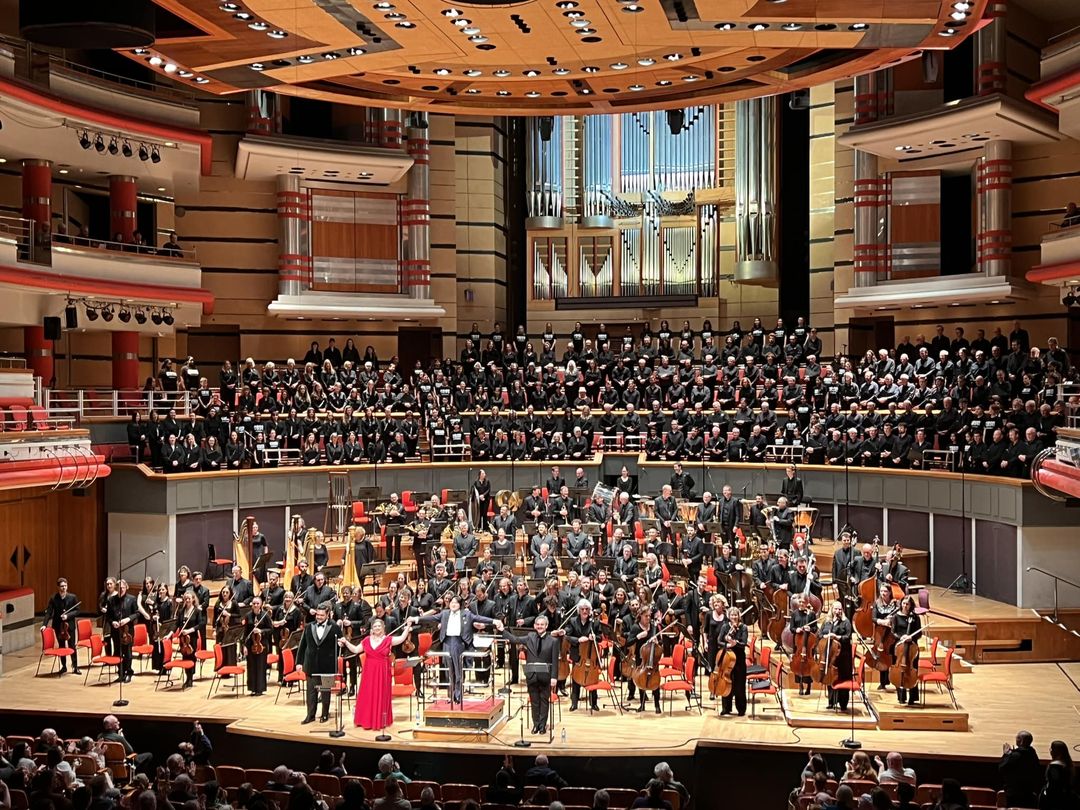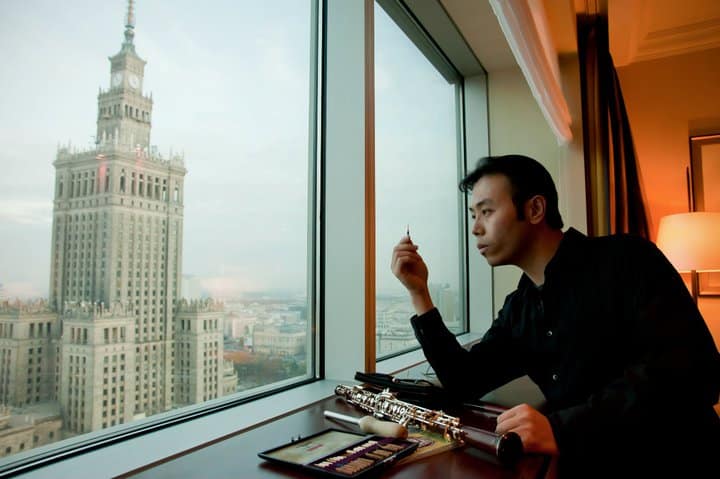Jorma Panula: Conductors need to start much younger
OrchestrasForget the criticism that Finnish maestros are not fully cooked. Klaus Mäkelä in Paris is 27, Tarmo Peltokoski (pic) in Toulouse is 22.
Finland’s chief maestro maker Jorma Panula, 92, is worried that the talent stream is dryinfg up because he is not seeing new candidates at the Sibelius Academy until they finish school. He wants to start training them at 14, latest.
So he has launched a new conducting competition in the town of Vaasa. No-one over 20 need apply.
Judges include Ed Spanjaard, Maria Badstue, Vytautas Lukočius and Mikko Franck.






On the contrary, young conductors often lack the depth of experience to say anything really insightful. That’s not to say they might occasionally turn out a first-rate performance, but this is the exception rather than the rule. It is often far preferable in my opinion for conductors to develop an original musical voice through instrumental performance and/or composition, alongside their conducting studies. Unfortunately being made music director of a full-time professional orchestra at a young age, exciting though it is, does not easily allow this crucial period of learning and development. There is also a danger that the cult of youth means that those who come to conducting later on, often through a very great sense of musical purpose, won’t get a break.
This is a bit tongue-in-cheek and Jorma enjoying his dotage with his usual wry smile.
I don’t agree.
Look at the conductors from the past : they all started very young : Karajan, Walter, Böhm, E and C Kleiber, Haitink and so on and so on.
People here always forget that : conductors who are now in their grand age were once (very) young conductors.
What upcoming wannabe conductors need more than anything: experience playing in an orchestra. No amount of classroom work is as useful as spending years playing in an ensemble under the guidance of a good conductor. George Szell knew this, and even his few students in Cleveland who were mostly pianists, were expected to play in the percussion section to get some experience in the band. Plus, too many young conductors simply don’t know the repertoire, the traditions.
That was hardly the way most of the older generations of conductor started. In Europe it was almost the tradition that potential young conductors would start as students of excellent teachers like Panula and Swarowsky. They’d then go on to become repetiteurs with opera companies. By the time orchestral rehearsals started on stage, they would be invaluable ears for the work’s conductor, occasionally taking over the baton so the conductor could sit in the auditorium to check issues like balance. From there they would progress to assistant conductor positions, perhaps also gaining experience conducting local orchestras. Then they would continue up the ladder (Klemperer, Fricsay, Reiner, Erich and Carlos Kleiber etc.) Few actually played full-time in orchestras because they were primarily pianists – not even George Szell(!), yet many become some of the great conductors we now all but revere.
The other route was to be a prize winner at an international competition (Abbado, Jansons etc.) and go on to further training with a major conductor, sometimes joining an orchestra in an Assistant Conductor position. A few like Toscanini and Giuliani did certainly start as members of an orchestra, but then they were professional string players and not pianists.
Panula’s (who retired from his post at the Sibelius Academy in 1993) class never worked this way. He was (and has continued to be) just very good at spotting talent among young instrumentalists and was able to offer them the right tools and resources, including a proper orchestra to conduct during their studies. Some of them were already professional orchestral musicians before joining the conducting class. Most of his successful students have skipped the opera company repetiteur part of their careers and started immediately off as freelancers working with decent European orchestras before landing their first longer-term appointment.
Kempe played the oboe In an orchestra before
Becoming a conductor
Erich Leinsdorf in his autobiography “Cadenza” makes an interesting point: that in Europe there is a clear progression in tiers that applies to both orchestras and opera houses. You start here and if you are good, you progress to there, and so on and so on. No stigma to where you start out, it is just assumed and expected that this progression will be followed. (Frieda Hempel made a similar point about opera singers in Europe, although she was writing about the hierarchy of the opera houses being inseperable from the hierarchy of the local aristocracy but the same point: the pathway was established in advance, and followed.
By contrast, Leinsdorf wrote, in the USA you run the risk of destroying any hope of getting a top orchestra if you start too low on the rungs of local and regional orchestras. He was writing specifically about his experience in Rochester, but other cities can be named. Don’t start THERE or you’ll have a hard time moving up the line, and don’t stay THERE too long or likewise the next level will be denied you. Yes we can all think of exceptions, but I do think there is a certain level of orchestra which might be excellent for learning repertoire and traditions, but is nearly disqualifying on a resume. Stated another way, perhaps the progression in quality of orchestra is clear, but the same conductor is not expected to follow that progression. Which in turn explains why conductors who avoid the progression for career reasons, had been deprived of the musical benefits in terms of knowing the ropes.
David K. Nelson: at some point Leinsdorf also writes (I don’t remember in wich book)
“Agents today are brokers who treat their artists like stock”
– and that was in the early 70s (!)
This makes me sick. I want to see more composer conductors age 40-60 taking podiums. People who have absorbed the literature.
I quite agree Jellicle- there are far too many Baby Faced Pretty Boy conductors around these days (including a few girls) & a lot of the offenders are Finnish- of which we’ve got to blame Panula- who’s taking the mick here! Other commentators have quite rightly observed that many of the great conductors of the past learnt their trade through being repetiteurs in the opera house (Solti & Swallisch being notable examples). But this means of getting into conducting is largely redundant as the Classical Music Industry is desperate to fill magazine columns & put bums on seats in increasingly half full concert halls.
Panula is not the only one who has thought this way, but it seems some of those who commented misunderstood his meaning. Markevitch insisted that a conductor must begin considerably younger than 14; his model was Barenboim, whom he had as a pupil at age 9. This doesn’t mean that someone should have a job at 9 (or 14, or 22, or any age in particular), but that the necessary skills are only acquirable by someone whose development hasn’t progressed too far already. If that’s the thinking, then it makes sense to have a competition (whose “prize,” presumably, is training in depth) with a maximum age of 20.
Panula is an idiot. what exactly can teens and 20-somethings teach (maestro means teacher) orchestras? 95% are not accomplished pianists/violinists at an international level. this is arrogance and egotism. bad combination for teaching
Perhaps Ronald Ericsson will enlighten us about the conductors he has trained and how they can be compared with those many eminent conductors who studied with Panula. We can then more properly judge his clearly preposterous statements about “arrogance and egotism”. Panula is hugely respected in the music profession and knows what he talks about. How then is he an “idiot”? Mr Ericsson cannot be allowed to make such ‘idiotic’ statements without some sort of proof!
Conductors don‘t „teach“ orchestras.
Conductors make music, transform compositions, noted ideas and instructions, into musical sound. HOW this is achieved is manifold in its ways and methods.
But it‘s important not to make the mistake to not see the wood for the trees here.
Also… considering how many masterworks have been created by very young composers (Mozart, Schubert, Mendelssohn,…) it is foolish to claim only age could bring meaningful and inspired interpretation with it.
(the meaning of the word ‚maestro‘ is irrelevant. no good conductor I know uses that word for describing his profession.)
I have an enormous amount of respect for several Finnish conductors of the previous generation. However, just as too much success and power always ends up corrupting, the Finnish conducting school has unfortunately become a mafia in itself. Self-supporting, self-affirming, and expecting the world to accept it as all-superior (which of course, is a self-fulfilled prophecy as the world does). Now, encouragement of ego, PR, narcissism and younger-and-younger related nonsense is being encouraged by them – and because of their reputation – is being more and more accepted by the industry… with any skepticism swiped aside with the excuse of the ‘wry-smile’ and Finnish ‘dry-sense of humour’. How humanity has always loved to follow fashion, and excuse that which should be called into question.
Conductors shouldn’t start at all!
Typically ignorant statement of a type that is sadly becoming increasingly common on SD. Too much dumbing down!
I did a childrens this season concert with a young Dudamel Fellow. A boy really. When the script called him “maestro,” it made me ill.
It diminishes everything about what a maestro should be. This boy conductor had everything to learn, and absolutely nothing to teach.